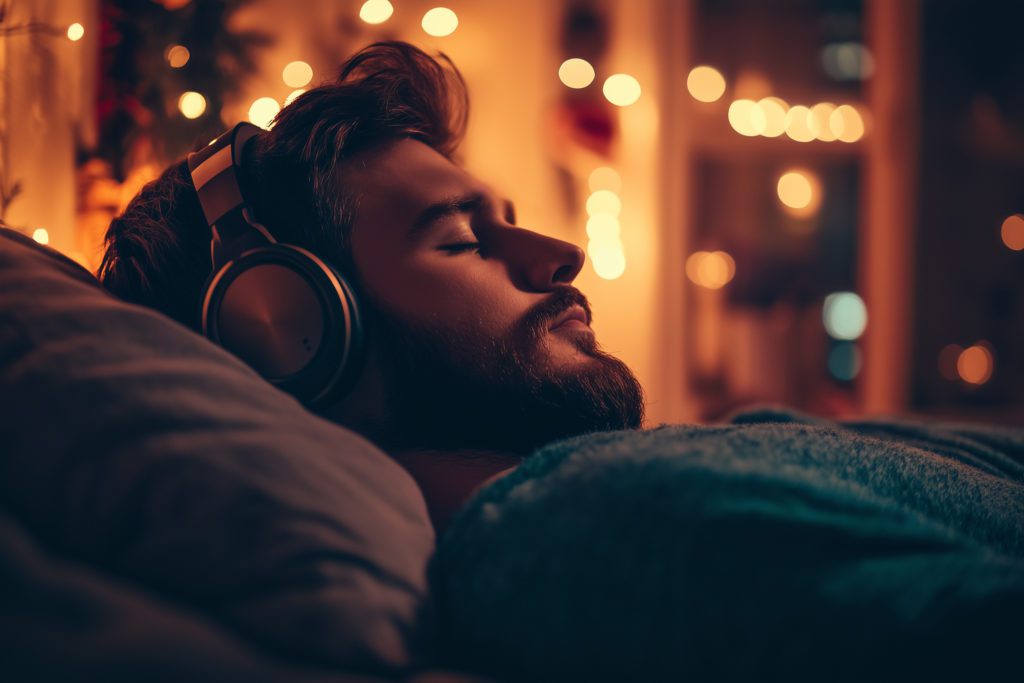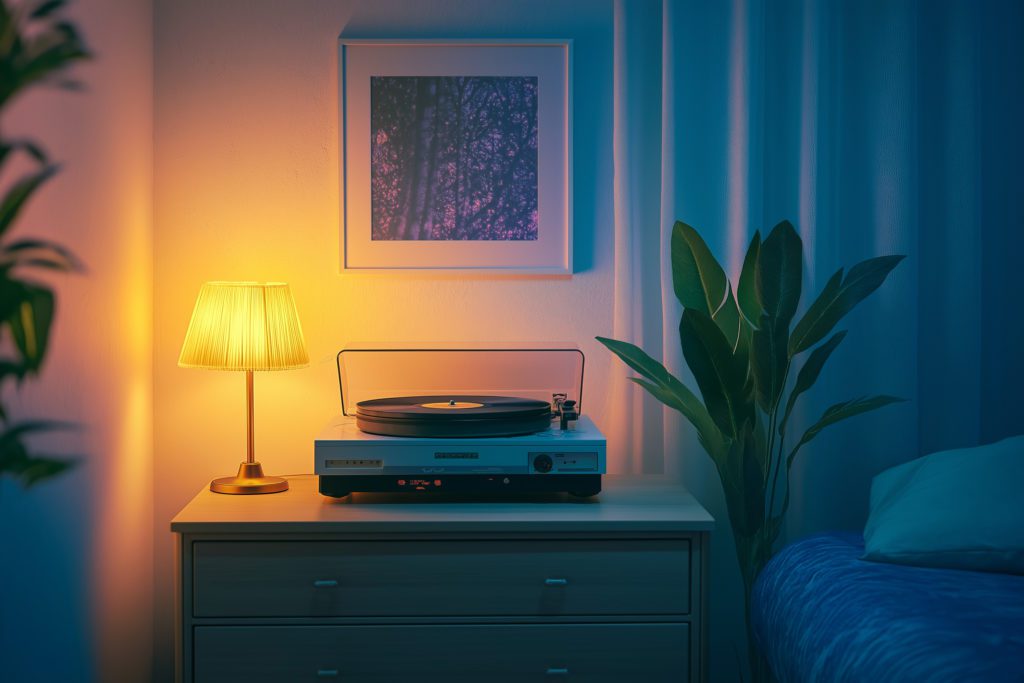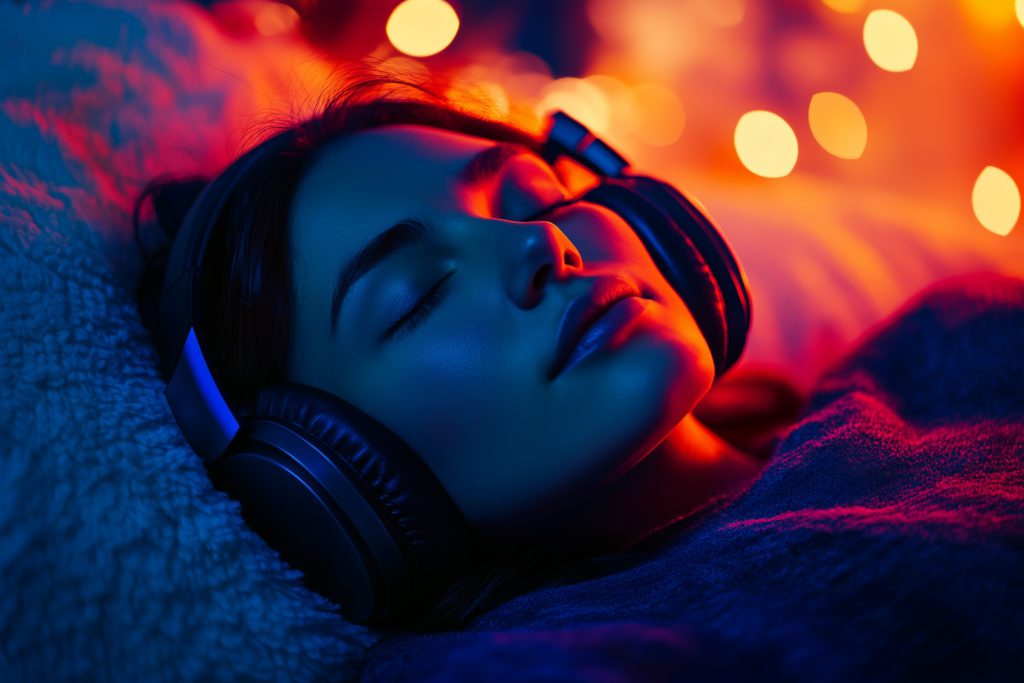
ASMR for Stress Relief: A Pathway to Better Sleep
ASMR produces a state of relaxation that is perfect for sleep. Explore how ASMR can reduce your stress levels and help you sleep better tonight.

When you feel your stress levels rising, it’s helpful to have methods of reducing your stress on hand so that you can quickly calm your body and mind. If this stress crescendos as you’re trying to fall asleep, having these tools at the ready can be crucial for preserving your sleep and ensuring you wake up in the morning well-rested.
ASMR is one way to help lower your stress levels, and when you find the right trigger, you can reduce your stress levels whenever they start to rise.
What is ASMR?
ASMR, which stands for autonomous sensory meridian response, is a state of deep relaxation in which someone experiences a “tingly” response to certain stimuli. It’s estimated that only 28%-38% of people experience ASMR, and what triggers the sensation can differ for everyone.
When ASMR occurs, it causes a static-like feeling to spread through the body, often starting at the scalp and then spreading down the spine. It may sound unusual, but those who experience it find it highly pleasurable, not least of all because it brings along intense relaxation and euphoria.
ASMR does more than cause this tingly sensation; it alters our state of mind. Brain imaging of those experiencing ASMR has shown that this response causes certain areas of the brain to appear stimulated, specifically those involved in our social behavior cues, reward system, and feelings of empathy.
How Does Stress Affect Our Sleep?
Stress is one of the most common hindrances to our sleep, let alone our well-being.
Chronic stress brings along an increase in the stress hormone cortisol. Typically, cortisol rises and falls during the day in a pattern regulated by our circadian rhythm. Cortisol reaches its peak in the morning, which correlates with its primary functions: waking the body up and promoting alertness. Based on this, it’s clear that cortisol has a time and purpose that does not align with sleep—so what happens if cortisol is high at night?
When you have cortisol pumping through your body, your body responds with a higher heart rate, rapid breathing, and sharpened senses, all of which can make sleep harder to come by.
Additionally, the body responds to cortisol through the hypothalamic pituitary adrenal (HPA) axis in your brain, but your sleep influences the HPA axis, as well, by producing an inhibitory effect. The HPA axis releases hormones as needed to respond to your body’s needs, but if your cortisol is high while you’re trying to sleep, the HPA can release conflicting hormones. As a result, when the HPA axis is overactive because of stress, sleep may be inhibited, and you may wake up more during the night.
Even more, these sleep disturbances can then affect your HPA axis, further increasing your cortisol production. For example, studies have shown that insomnia can cause your body to secrete more cortisol during the day, potentially to stimulate alertness in response to a lack of sleep. However, this can equate to more cortisol in the body come bedtime, perpetuating the cycle of sleeplessness.
If you think that a stressful situation can’t possibly raise your cortisol levels enough to cause dysfunction in your body, think again. A study on medical students preparing for a committee exam measured their cortisol levels 40 days before the exam and then again on the day of the exam. The researchers reported that the cortisol levels of the students were approximately nine times higher when they were stressed versus when they weren’t.
In addition to the rise in cortisol that stress prompts, stress can also cause ruminative thoughts that make it hard to fall asleep simply because it feels as though your mind won’t turn off.
In all these ways, stress can make it hard to fall and stay asleep, but ASMR offers a way to reduce stress.
Using ASMR to Reduce Stress
If you’re feeling stressed and can’t sleep because of it, ASMR may help.
ASMR has been shown to reduce both anxiety and stress levels. In fact, relaxation is the hallmark sensation reportedly achieved in those who experience ASMR. Not only does this relaxation remove stressful thoughts, but it can also release tension in the body, setting you up for sleep.
ASMR can also reduce your stress levels by improving your mood. Research on ASMR has found that it can elevate someone’s mood, which not only enhances their quality of life but can also improve their sleep since around three-quarters of those with depression are suspected to suffer from insomnia.
Additionally, ASMR offers a distraction from stressful thoughts. It gives you something else to focus on, which can keep those pestering thoughts at bay long enough to drift to sleep.
Adding ASMR to your Sleep Routine
With the ability of ASMR to lower your stress levels and promote relaxation, it can be the perfect addition to your sleep routine. Here are some tips for seeing its successful implementation and a calmer night.
Find The ASMR Trigger That Works for You
There’s more than one type of trigger for ASMR, and different people respond best to certain types.
The three types of ASMR triggers include:
- Sound-based triggers (e.g., whispering, soft voices, crunching, sweeping, crinkling, clicking, liquid pouring)
- Physical triggers (e.g., hair stroking, gentle face touching, a massage)
- Visual triggers (e.g., watching someone else receive caring touches, watching a video where the subject completes gentle hand movement, watching someone else complete an artistic task)
There are a few things to keep in mind regarding triggers. First, physical triggers are often the most successful at triggering ASMR, but they also cannot be completed on your own. Additionally, while nature soundscapes can also trigger ASMR, sounds generated by human activity are more likely.
Combine ASMR With Mindfulness and Deep Breathing
To lower your stress even more, try combining ASMR with mindfulness meditation and deep breathing.
Opt For Screen-Free ASMR
While ASMR is common across social media, using your phone or other electronics before bed can suppress melatonin production, making it harder for you to fall asleep. Additionally, you may get sucked into social media, which may raise your stress levels, negating the benefits achieved with ASMR.
Instead, opt for screen-free ASMR, such as having someone rub your back or listening to auditory ASMR available with Pillow. If you can’t achieve ASMR without your screen, try to use it at least an hour before bed.
Destress and Sleep better with ASMR
ASMR is a state of relaxation achieved with the help of various auditory, visual, or physical triggers. Not only can it reduce your stress levels, but it can also promote relaxation, making it a great addition to your nighttime routine.
The next time you feel your stress levels rise, try adding in ASMR and see if you can trigger this sense of relaxation to have a stress-free night.

Written by
Jessica G
Medical writer freelancer who has written hundreds of articles on varying topics. Masters of Engineering degree in Biomedical Engineering.
Download Pillow
Get help
Press & News
Legal
Connect
X (Twitter)
Company
Copyright © Neybox Digital Ltd.



